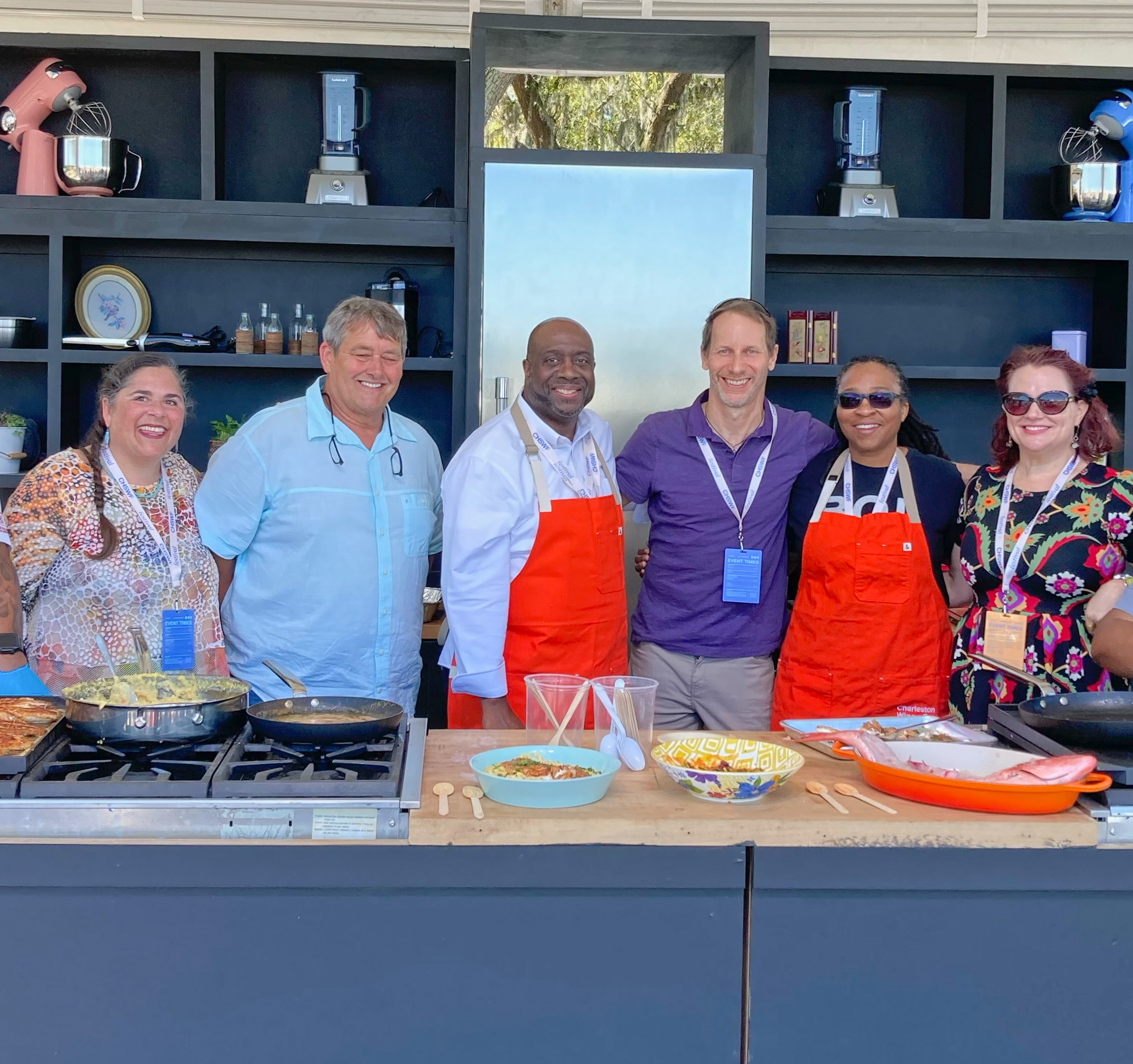One conversation at a time.
That has been One Fish Foundation’s mantra since the outset. Sustainable seafood conversations aren’t linear, and they often require some work to get folks to understand their decisions matter to the seafood, the fish harvester, the community, and the ocean. Having these conversations one at a time implies thoughtfulness about tailoring the approach to each audience.
Such was the case in Charleston, S.C. March 2-5, when One Fish Foundation collaborated with Slow Fish North America and Slow Food USA to bring seafood with values conversations to multiple audiences in a variety of venues and formats.
Each event was successful for two reasons: First, Colles and Slow Food USA Director of Programs Mara Welton worked with great partners: Charleston Wine + Food, Slow Food Charleston, Abundant Seafood, and several chefs (mentioned below) to plan and execute each event. Second, we built the “one conversation at a time” ethos into the planning, content creation, storytellers, and approach to each gathering.

Flounder crudo bursting with bright, spring flavors at Estadio.
We engaged folks at two pop-up events at different venues. The first event was at Estadio, a tapas restaurant that offered select dishes with sustainably sourced seafood marked on the menu with a Slow Fish snail. A portion of the proceeds of those dishes will go toward supporting future Slow Fish events. The dishes included a palate-awakening flounder crudo, local grilled shrimp, smoked mackerel conservas and an outstanding seafood paella. There, we spoke with folks about Slow Fish values and the connection we have with the seafood we eat.
Abundant Seafood, a store exemplifying Slow Fish values of good, clean, and fair, co-hosted the second popup with Hamfish, a catering business run by Chef Blair Machado. Blair and his crew produced a menu of creative and vibrant dishes ranging from whole grilled snapper to amberjack nigiri and some excellent preparations (raw with tangy mignonette or grilled with shrimp butter and coconut breadcrumb) raw oysters from Shell’em Seafood in Wilmington, N.C.
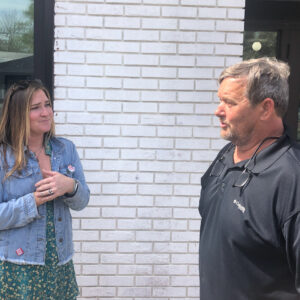
Abundant Seafood Co-Owner and Fisherman Mark Marhefka discusses fisheries management and habitat preservation with Ana Shellem at the popup.
Ana Shellem had to dive for some of the oysters a couple of days before the event because the tides were off. She wild harvests oysters, clams, mussels, stone crabs and a variety of seaweed. During the event, she told the story of harvesting with Nature’s rhythms and why we should know our seafood producer, and/or where the seafood is from.
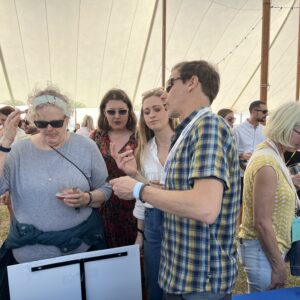
Discussing the 7 C’s of Sustainable Seafood with attendees at Shucked.
Another event was Shucked, a ticketed gathering with close to 1,000 attendees sampling oysters and a variety of food and beverage and interacting directly with producers, chefs and others. We shared a table with Barrier Island Oysters, and together, we spread the message about seafood with values and knowing your oyster grower. We had more than 50 direct conversations with folks about Slow Fish, Slow Food, Shell’em Seafood, Barrier Island Oysters, and One Fish Foundation.
The final event was a Seafood Throwdown on the main stage during “locals day” at the festival’s Culinary Village. Chefs Kevin Mitchell and Tia Clark created delicious, Lowcountry fare featuring the vermillion snapper that Mark Marhefka of Abundant Seafood caught earlier in the week off the South Carolina coast.
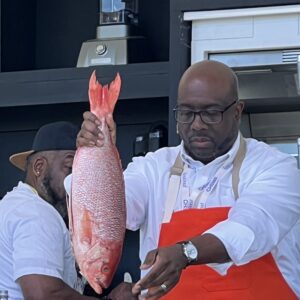
Chef Kevin Mitchell prepares to demonstrate how to fillet a fish, in this case, vermillion snapper.
A member of the Slow Food USA Board of Directors, Kevin is the first African American chef instructor at the Culinary Institute of Charleston, and just released a cookbook with David Shields called “Taste of the State.” Tia runs Casual Crabbing with Tia, perhaps the coolest AirBnB experience you’ll find on the East Coast. She teaches folks how to catch crabs and other local, in-shore seafood and the importance of cultural connection to that food.
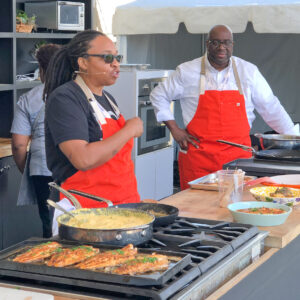
Tia Clark shares the story of learning to cook Gullah Geechee fare from her grandmother.
She cooked parmesan grits adapted from her Gullah Geechee grandmother’s recipe, while Kevin’s recipe spotlighted succotash and a red gravy. Kevin demonstrated how to fillet a whole fish, and talked about the benefits of spooning out excess meat along the bones before using the bones for a fish stock.
Mark Marhefka talked about the fishery, the seasonality of the fish, and how to tell if a fish is fresh (clear eyes, bright skin color, firm flesh, etc.). Emcee Stephanie Burt of The Southern Fork Podcast steered the conversation as we talked about the importance of knowing the story of the seafood we eat. After Tia was crowned the winner, members of the audience were able to try both chefs’ dishes and connect the taste flavors with the storytelling.
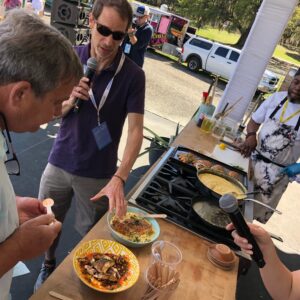
Seafood Throwdown judging is a tough job, but someone has to do it.
Nearly 200 folks stayed through the Throwdown cheering on the chefs and asking great questions about sustainable seafood.
The common thread throughout all of these Slow Fish Rising Tide events in Charleston was sharing what seafood with values means … one conversation at a time.
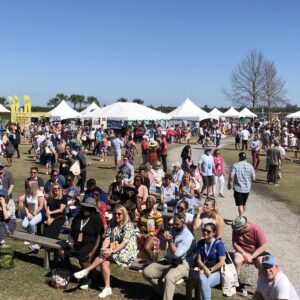
The Seafood Throwdown crowd was focused on the chefs’ cooking and storytelling on stage. Photo by: Mara Welton.
Top photo: Slow Food USA Director of Programs Mara Welton, Fisherman and Abundant Seafood co-owner Mark Marhefka, Chef Kevin Mitchell, Colles, Chef Tia Clark and Emcee Stephanie Burt at the Slow Fish Seafood Throwdown.


